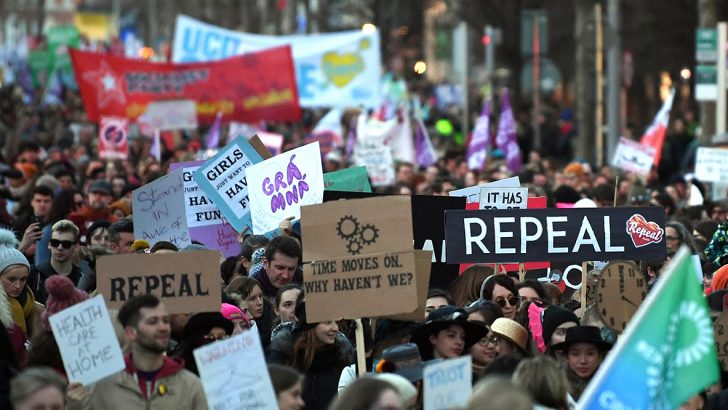“Will you watch the new film, The 8th, about the 2018 referendum?” I asked a friend who had canvassed for the pro-life cause in that plebiscite.
“Through gritted teeth,” she replied. The film was, as the film critic Donald Clarke put it, “ecstatic” for its’ natural constituency – that is, the pro-choice side. (It is also partly funded by George Soros’ Open Society Foundation, which has backed abortion rights globally.) But my friend was right to say she’d watch it: because The 8th is also a record of the pro-choice campaign, and how they successfully won ‘the middle ground’ by focusing on ‘care and compassion’.
And its main protagonist, the veteran gay feminist Ailbhe Smyth, came across as sensible, good-humoured and indeed caring. She had been married to a man when young and had a daughter, and now two-grand-daughters, and she repeatedly said she was motivated to protect women’s wellbeing.
Much was made of the appalling ‘Miss X’ case in 1992 when a 14-year-old rape victim sought an abortion in England: I would also like to see a lot more made of exposing the perpetrator of that rape and the penalties he deserved. Much was also made of the tragic death of Savita Halappanavar: justifiably, since Savita became central icon of the pro-choice campaign. But it would have been responsible to provide more information and context: Mrs Halappanavar died from sepsis, and the Galway hospital mismanaged the case – the coroner’s judgement was that she died of “medical misadventure”. Here her death was simplistically attributed to the Eighth Amendment. This narrative went around the world: ‘Ireland murders pregnant Indian dentist’.
Some airtime was given to pro-life activists – Wendy Grace and Maria Steen were articulate and sincere. The renegade priest Fr Michael Clearly – although he died in 1993 – was repeatedly featured in old clips. Bewildered-looking old dears saying the rosary were frequently contrasted with young, nice, attractive, cool people being joyfully upbeat and moving in emotional solidarity.
Prof. William Binchy was sharply reprimanded by Kate O’Connell, then a TD, and the film cuts at that point. The brilliantly-organised ‘Home to Vote’ campaign showed more young, nice, attractive, cool folk arriving at Dublin Airport to cheers from pro-choice activists.
The directors – Aideen Kane, Lucy Kennedy and Maeve O’Boyle – make an effort at showing some of the younger people on the pro-life side. But the film could be called ‘how we won the battle of the Eighth Amendment’. It could also serve as a teaching tool on how to conduct a political campaign. The ‘Together for Yes’, organised by Ailbhe Smyth, was tactically masterful.
Everyone experienced in abortion debates knows that the issue is complicated. There are desperately hard cases, and as medical progress advances, these become harder, with sophisticated pre-natal diagnosis. Yet the basic statistics are chilling: Britain legalised abortion in 1967-8, broadly for health reasons. In the first year, terminations ran at about 50,000. Currently, abortion in England and Wales is at 200,000 annually – having risen year on year, unstoppably. It’s become routine birth control. A British pro-choice campaigner, the late Prof. Peter Huntingford, told me: “Abortion is better than contraception in that it allows a woman decide if she wants to be pregnant, after she is pregnant.” But is this a way to approach human life?
***
In contrast, a documentary on ITV, shown recently (May 26) showed a redemptive approach to socially hard cases – and life’s capacity to recover and restore itself. Nicky Campbell and Davina McCall’s Foundlings traced the lives of three people who were abandoned as newborns. Yes, in modern-day Britain, babies are still left in phone boxes, public toilets, in churches.
Steve was born in March 1989, and was abandoned in a toilet near Wolverhampton football pitch. He was raised in Staffordshire by loving adoptive parents: he had a happy childhood and seems well-adjusted. But he always wondered why he had been abandoned. The programme did the DNA investigations, and found his biological father, who welcomed him with open arms. He is in touch by letter with his birth mother, who never forgot him, but she was in a desperately difficult situation and she needs time to explain all that.
Sarah Dunkley was born in a London hospital, but her mother gave a false identity and address, and left her there. After a lengthy process, researchers discovered that she had a full sister, Carole Murphy, who was born in the same circumstances – abandoned in a hospital. Both are now on the track of their biological parents’ story, whose relationship was complex. Both sisters came across as pleasant, balanced, and indeed prosperous young women, both married and with children of their own.
The programme’s attitude to the foundlings’ mothers was truly compassionate and understanding. These mothers felt hopeless. They left their babies for someone to find. Yet – they gave life.


 Mary Kenny
Mary Kenny Demonstrators hold posters at a rally campaigning to repeal the Eighth Amendment in 2018. Photo: CNS
Demonstrators hold posters at a rally campaigning to repeal the Eighth Amendment in 2018. Photo: CNS 